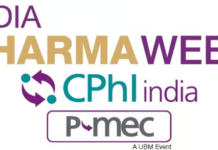IAAH 11th World Congress on Adolescent Health to be held from 27-29 October in New Delhi under the supportive guidance of the Union Ministry of Health and Family Welfare.
New Delhi, October 20, 2017: The biggest global event in adolescent health – The World Congress on Adolescent Health – is coming to India. Held only once every 4 years, the International Association for Adolescent Health’s 11th World Congress on Adolescent Health, ‘Investing in Adolescent Health – the Future is Now’ will be held in New Delhi, India from 27-29 October 2017. The world is home to 1.2 billion adolescents, and India has the largest population of adolescents in the world – 253 million[1]. This demographic makes India a potent host for a global conference on this theme.
According to Manoj Jhalani, Additional Secretary & Mission Director, MoHFW, “The National Health Mission guidelines on adolescent health are a step forward in ensuring a healthy, young India. The government of India is deeply committed to streamlining efforts to ensure comprehensive approaches to dealing with adolescent health. Through various programmes and initiatives, different aspects of adolescent health including nutrition, sexual and reproductive health, NCDs, mental health and more, are being addressed in tandem with each other, incorporating a much-needed life-course perspective into overcoming public health challenges.”
“With the largest number of adolescents in the world, India is being watched by the world with hope, and we must lead the way in setting examples through our commitment to securing the health of young India. The upcoming World Congress, therefore, could not have come at a better time for India,” says Vandana Gurnani, Joint Secretary, MoHFW.
Dr. Ajay Khera, Deputy Commissioner, MoHFW, says, “The Ministry of Health and Family Welfare is very happy to support the ‘11th World Congress on Adolescent Health’ being held by the International Association for Adolescent Health (IAAH). We are giving the highest priority to addressing adolescent health issues, and ensuring a healthy and bright future for our adolescents. Programmes like RKSK don’t just address maternal and child health needs but also talk about the risks of non-communicable diseases and drug abuse, and the necessity of addressing mental health issues.”
The World Congress seeks to cover topical themes through discussions in sessions such as ‘Global adolescent health: Opportunities and challenges’, ‘Programming for adolescent health in India: RKSK and beyond’, ‘Toward a gendered approach to adolescent health’, ‘Mental health and adolescents’,‘Early Adolescent Health and Development in Low and Middle-Income Countries’,‘Social Media, Sexting, Addiction, Oh My! Adolescent Health in the Digital Age’, and more. There will also be debates on topics including the need for parents’ consent in their child’s clinical care or participation in health research; the role of brain imaging in adolescent care and health promotion; and on whether to promote condoms or contraceptives among adolescents.
The conference – thefirst-of-its kind to be held in India – will see the participation of prominent global public health experts as well as policy makers including the likes of Dr. Sunil Mehra, Executive Director, MAMTA Health Institute for Mother and Child, Mental Health expert Prof. Vikram Patel from Harvard University, David Ross from the World Health Organization, Prof. Susan Sawyer, President of the International Association for Adolescent Health, Prof. Robert Blum from Johns Hopkins University, Ms.Suzanne Petroni of International Center for Research on Women, Ms. Kate Gilmore, Office of the High Commissioner for Human Rights, and many more.
Globally, adolescence is demographically dense – a period which encapsulates tremendous change in relation to critical life events such as transitions from education to employment, and formation of families and parenting. Adolescence is also the period in which individuals experience the greatest change in health and health-related behaviours across their lifetime. Well recognized as a time of risk for health, increasingly adolescence is now recognized as a period of opportunity for health, in which individuals gain the assets and resources to sustain health across the life-course.
The mortality of adolescents globally stands at astaggering 1.3 million deaths per year. Unintended injuries such as road traffic accidents and drowning are the leading causes of death among adolescents, together with self-harm, interpersonal violence, communicable diseases and teenage pregnancy[2]. Tobacco, alcohol and other substance use contribute to health concerns among adolescents (e.g. injuries) and are associated with unemployment, accidents, depression and suicide during adolescence. Yet rather than being a passing phase, these behaviours and states risk reverberating across the life-course, contributing to the future burden of disease in adults and to that of the next generation.
The agenda for Sustainable Development Goals 2030 and the new Global Strategy on Women’s Children’s and Adolescents’ Health have brought adolescence to the centre-stage. These agendas recognize the opportunities and contribution of adolescence to achieving a wide array of global health priorities including improvements in communicable diseases (e.g. HIV) and non-communicable diseases, women’s health, mental health, nutrition, and more. For example, over half of new HIV cases occur in adolescents, and more than 2 million adolescents are living with HIV. Addressing the global HIV epidemic – and other key global health agendas, will not be achieved without attending better to adolescent health and wellbeing.
The World Congress is being organized under the supportive leadership of the Ministry of Health & Family Welfare, Government of India. MAMTA Health Institute for Mother and Child (MAMTA) is the lead organisation that is hosting the World Congress with a consortium of partners including Pathfinder International, Population Foundation of India (PFI), Population Services International (PSI), and The YP Foundation. The World Congress also hass cientific support from Indian Academy of Pediatrics (IAP), Federation of Obstetric and Gynecological Societies of India (FOGSI), Public Health Foundation of India (PHFI) and Trained Nurses Association of India (TNAI).
“Adolescents need to be at the centre of future investment in health and education for sustainable development”, says Dr. Sunil Mehra, Executive Director, MAMTA Health Institute for Mother and Child.
Professor Susan Sawyer, President, International Association for Adolescent Health, says, “This meeting couldn’t be better timed, as never before has there been such global recognition of the importance of advancing the health and wellbeing of adolescents, including in India. IAAH is delighted that the 11th World Congress on Adolescent Health is in the country with the largest number of adolescents in the world. A groundswell of professionals, global partners and young people are coming to Delhi from all over the world to share ideas, evidence and actions to advance adolescent health. The world is looking towards India and we are confident this World Congress will deliver.”
The World Congress is anticipating around 800 international and national delegates includingadolescent health experts from across the globe, academia, representatives from MoHFW – Government of India, national and global representatives of UN organizations, youth leaders from several countries including India who have made a difference in their communities, national and international NGOs, donor organizations, policy makers and corporates.
It is key to align the interests of the most important section of the population – the future agents of change – with the Government’s vision of ‘New India’. It is only by investing in the young people of today that we can safeguard the future as the future wealth of nations requires young people to be educated, empowered and healthy.
The World Congress will be an ideal platform for networking with global public health practitioners,share learnings from global case studies and successful interventions in adolescent health and policies, and an opportunity to track global policy developments and policy effectiveness in adolescent health. There will be a strong focus on gender norms and human rights. The World Congress will also conduct Skill Development Workshops on 26th October with participants from around the world. The media is invited to attend all the sessions at the World Congress. An invitation with the detailed agenda of the World Congress will be shared soon.
Website: www.iaah2017congress.org.
Programme Schedule: http://www.iaah2017congress.org/programme.html.
[2] Patton GC, Sawyer SM, Santelli JS, Ross DA, Afifi R, Allen NB. Our future: a Lancet commission on adolescent health and wellbeing. The Lancet. 2016 Jun 11;387(10036):2423-78 (available online)
Newsvoir





















